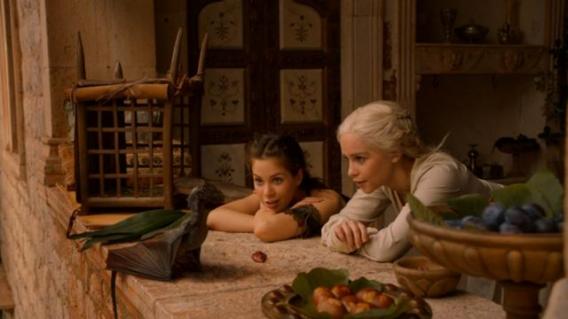Economics of Ice and Fire, Part 3: The Market for Dragons

Courtesy of HBO
This is part of a series of posts about the fictional economy of George R.R. Martin's Song of Ice and Fire, so nonfans may wish to ignore it, but the principles are applicable to the real world. Post 1 argues that House Tyrell is in fact richer than House Lannister, while Post 2 considers the Lannisters' investments in sovereign debt.
One question raised by many readers of my original post on gold versus agricultural land was whether the richest house in all the land isn't really House Targaryan with its valuable dragons. I wanted to wait to discuss that until Episode 4 of Season 3 aired Sunday night, since it dramatizes the fact that assessing the market price of dragons is very problematic. The main issue is that this is what we would call a thin and illiquid market. There are very few dragon sales happening, so the price of dragons hinges entirely on the idiosyncratic decision-making leading up to a single transaction. Nobody knows what price a dragon would fetch if Daenerys tried to offer it up at a widely publicized auction. What we know (from the books where the transaction is spelled out in more detail) is that Kraznys Mo Nakloz is willing to trade 1,000 Unsullied for the goods carried by the Vhagar, the Meraxes, and the Balerion and to trade 1,000 more for the three ships themselves. But for her plan to work, Daenerys needs to buy all 8,600 Unsullied. Krazynys agrees to sell the whole lot for the three ships, their contents, and a single dragon. Hence a dragon is worth 6,600 Unsullied, a ship is worth 333 Unsullied, and thus a dragon is worth approximately 20 ships. Spoilers are involved in the details, but from the books we know that Sallador San has at least 29 ships left after the Battle of Blackwater, so in pure financial terms, three dragons does not seem to make House Targaryen all that rich compared to the great houses of Westeros. Certainly, though, it's valuable property.
But as we said, it's a thin and illiquid market.
It's also a market that illustrates a few other important points. One is complementarities. An expensive piece of equipment can be totally useless unless you know how to use it. Give me a Boeing 737, for example, and it's not going to change the fact that I don't know how to fly an airplane. The actual market value of a 737 depends on the existence of a sufficiently deep pool of skilled pilots that a would-be purchaser of such a vehicle could employ. As it happens, while trained pilots aren't exactly a dime a dozen, there are a bunch of them, and this is a plane that's been in widespread use for 40 years. The full parameters of the Targaryen special relationship with dragons aren't fully explained even by the end of the fifth book, but it seems to be the case that the ability to actually work with a dragon is extremely rare. A dragon in the hands of a skilled worker is extremely useful, but the supply of skilled labor is so small that it in practice it makes no sense for anyone to buy one.
A related issue—one that Kraznys neglects to his misfortune—is assymetrical information. When someone offers you a dragon for 6,600 Unsullied, you ought to be suspicious. Why is she so willing to sell? What does she know about the dragon that I don't know? Among other things, she has three dragons. Is she trying to sell me a lemon? A similar issue exists on the other side of the transaction, but it's not so severe. Daenerys doesn't know nearly as much about the Unsullied as Kraznys does, but she is aware that the ongoing propserity of Astapor has a lot to do with the Great Masters' ability to maintain a credible brand. The Unsullied, in particular, have a very strong brand identity regionally. When you book yourself into a Ritz Carlton, you're being asked to commit to pay a price premium over less fancy hotels without getting a chance to inspect the facilities yourself. What you're supposed to believe is that Ritz Carlton's ability to demand that price premium depends on them maintaining a strong brand. Their interest in serving you well is part of a larger interest in preserving the brand. Large chains and corporate advertising campaigns thus play an important role in helping a modern economy overcome information problems.
Daenerys, on the other hand, has no brand and neither do her dragons. Consequently, she ought to find it very difficult to offload them to anyone for anything remotely resembling a fair price. Which may indicate that 20 ships is in fact far too low a price to evaluate dragons. Faced with the problem of being unable to sell a dragon for what it's worth, a person would only sell if she faced a truly desperate situation. Alternatively, she might sell if it was part of a clever scam. This turns out to be a scenario on which Daenerys' youth and gender are an asset, since Kraznys seems simply incapable of considering the possibility that a young woman is pulling a clever trick.
